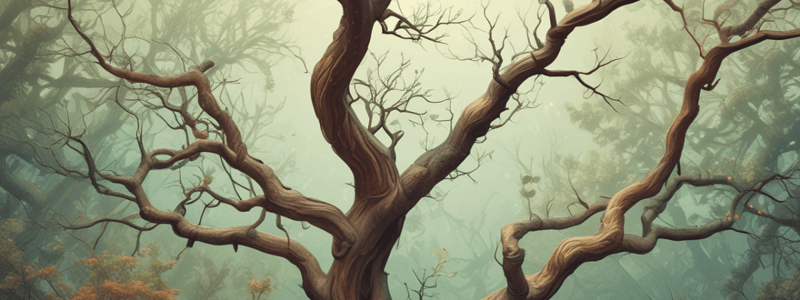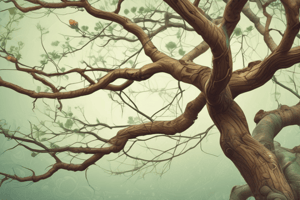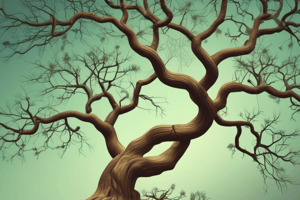Podcast
Questions and Answers
Which branch of biology deals with the study of plants?
Which branch of biology deals with the study of plants?
- Microbiology
- Botany (correct)
- Ecology
- Zoology
What is the process by which plants convert light energy into chemical energy?
What is the process by which plants convert light energy into chemical energy?
- Respiration
- Photosynthesis (correct)
- Metabolism
- Decomposition
What is the outer layer of the cell?
What is the outer layer of the cell?
- Mitochondria
- Plasma membrane (correct)
- Cytoplasm
- Nucleus
What is the process by which cells reproduce themselves?
What is the process by which cells reproduce themselves?
What is the theory that explains how all species of life have evolved over time?
What is the theory that explains how all species of life have evolved over time?
What is the process by which organisms with favorable traits are more likely to survive and reproduce?
What is the process by which organisms with favorable traits are more likely to survive and reproduce?
What are the non-living components of an ecosystem?
What are the non-living components of an ecosystem?
What is the process by which energy is transferred from one organism to another through food chains and webs?
What is the process by which energy is transferred from one organism to another through food chains and webs?
Flashcards are hidden until you start studying
Study Notes
Branches of Biology
- Botany: study of plants, including their structure, growth, evolution, and classification
- Zoology: study of animals, including their structure, growth, evolution, and classification
- Microbiology: study of microorganisms, such as bacteria, viruses, and fungi
- Ecology: study of the interactions between organisms and their environment
- Genetics: study of heredity, genes, and genetic variation
- Biochemistry: study of the chemical processes that occur within living organisms
- Biophysics: study of the physical principles underlying biological processes
- Biotechnology: application of biological principles to develop new products and technologies
Cell Biology
- Cell structure:
- Plasma membrane: outer layer of the cell
- Cytoplasm: jelly-like substance inside the cell
- Nucleus: contains genetic material (DNA)
- Mitochondria: generate energy for the cell
- Cellular processes:
- Metabolism: chemical reactions that occur within the cell
- Photosynthesis: process by which plants convert light energy into chemical energy
- Cell division: process by which cells reproduce themselves
Evolution
- Theory of evolution: all species of life have evolved over time through the process of natural selection
- Mechanisms of evolution:
- Mutation: change in the DNA sequence of an organism
- Gene flow: movement of genes from one population to another
- Genetic drift: random change in the frequency of a gene in a population
- Natural selection: process by which organisms with favorable traits are more likely to survive and reproduce
Ecosystems
- Ecosystem components:
- Biotic factors: living organisms (plants, animals, microorganisms)
- Abiotic factors: non-living components (water, temperature, light)
- Ecosystem processes:
- Energy flow: energy is transferred from one organism to another through food chains and webs
- Nutrient cycling: nutrients are recycled through the ecosystem
- Decomposition: process by which organic matter is broken down into simpler substances
Branches of Biology
- Botany is the study of plants, covering their structure, growth, evolution, and classification
- Zoology is the study of animals, including their structure, growth, evolution, and classification
- Microbiology involves the study of microorganisms, such as bacteria, viruses, and fungi
- Ecology explores the interactions between organisms and their environment
- Genetics is the study of heredity, genes, and genetic variation
- Biochemistry focuses on the chemical processes that occur within living organisms
- Biophysics examines the physical principles underlying biological processes
- Biotechnology applies biological principles to develop new products and technologies
Cell Biology
Cell Structure
- The plasma membrane is the outer layer of the cell
- Cytoplasm is the jelly-like substance inside the cell
- The nucleus contains genetic material (DNA)
- Mitochondria generate energy for the cell
Cellular Processes
- Metabolism involves chemical reactions within the cell
- Photosynthesis is the process by which plants convert light energy into chemical energy
- Cell division is the process by which cells reproduce themselves
Evolution
- The theory of evolution states that all species of life have evolved over time through natural selection
Mechanisms of Evolution
- Mutation is a change in the DNA sequence of an organism
- Gene flow is the movement of genes from one population to another
- Genetic drift is a random change in the frequency of a gene in a population
- Natural selection is the process by which organisms with favorable traits are more likely to survive and reproduce
Ecosystems
Ecosystem Components
- Biotic factors are living organisms (plants, animals, microorganisms)
- Abiotic factors are non-living components (water, temperature, light)
Ecosystem Processes
- Energy flows through ecosystems via food chains and webs
- Nutrient cycling involves the recycling of nutrients through the ecosystem
- Decomposition is the process by which organic matter is broken down into simpler substances
Studying That Suits You
Use AI to generate personalized quizzes and flashcards to suit your learning preferences.




